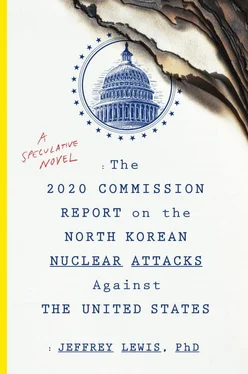Jeffrey Lewis - The 2020 Commission Report on the North Korean Nuclear Attacks Against the United States
Здесь есть возможность читать онлайн «Jeffrey Lewis - The 2020 Commission Report on the North Korean Nuclear Attacks Against the United States» весь текст электронной книги совершенно бесплатно (целиком полную версию без сокращений). В некоторых случаях можно слушать аудио, скачать через торрент в формате fb2 и присутствует краткое содержание. Город: New York, Год выпуска: 2018, ISBN: 2018, Издательство: Mariner Books, Жанр: Фантастика и фэнтези, Триллер, на английском языке. Описание произведения, (предисловие) а так же отзывы посетителей доступны на портале библиотеки ЛибКат.
- Название:The 2020 Commission Report on the North Korean Nuclear Attacks Against the United States
- Автор:
- Издательство:Mariner Books
- Жанр:
- Год:2018
- Город:New York
- ISBN:9-781-328-57391-9
- Рейтинг книги:4 / 5. Голосов: 1
-
Избранное:Добавить в избранное
- Отзывы:
-
Ваша оценка:
- 80
- 1
- 2
- 3
- 4
- 5
The 2020 Commission Report on the North Korean Nuclear Attacks Against the United States: краткое содержание, описание и аннотация
Предлагаем к чтению аннотацию, описание, краткое содержание или предисловие (зависит от того, что написал сам автор книги «The 2020 Commission Report on the North Korean Nuclear Attacks Against the United States»). Если вы не нашли необходимую информацию о книге — напишите в комментариях, мы постараемся отыскать её.
The 2020 Commission Report on the North Korean Nuclear Attacks Against the United States — читать онлайн бесплатно полную книгу (весь текст) целиком
Ниже представлен текст книги, разбитый по страницам. Система сохранения места последней прочитанной страницы, позволяет с удобством читать онлайн бесплатно книгу «The 2020 Commission Report on the North Korean Nuclear Attacks Against the United States», без необходимости каждый раз заново искать на чём Вы остановились. Поставьте закладку, и сможете в любой момент перейти на страницу, на которой закончили чтение.
Интервал:
Закладка:
Jeffrey Lewis
THE 2020 COMMISSION REPORT ON THE NORTH KOREAN NUCLEAR ATTACKS AGAINST THE UNITED STATES
A SPECULATIVE NOVEL

PREFACE
THE EVENTS OF MARCH 2020 represent the greatest calamity in our nation’s history. It is impossible for any of us to forget the scenes of horror and devastation, first in Korea and Japan, then in Hawaii, New York, northern Virginia, and south Florida. We present this final report and the recommendations that flow from it mindful that our nation is more divided than ever before, particularly over the question of responsibility for the chain of events that led to the first use of nuclear weapons in more than eight decades—and their first use against the United States of America.
Unlike any previous adversary in our history, North Korea waged a nuclear war against the United States and its allies. Although our forces prevailed, the scale of the destruction was unprecedented. We lost almost a million and a half of our fellow citizens that day.
As a result, Congress and the president established the Commission on the North Korean Nuclear Attacks Against the United States (Public Law 117-321), commonly called the 2020 Commission, “to find and report the relevant facts leading to the attacks using nuclear weapons made by Democratic People’s Republic of Korea upon the United States and its allies on March 22–24, 2020.” We, the members of this commission, established our offices at the Mount Weather Emergency Operations Center in rural Virginia so that our project could be co-located with the vast majority of government functions, which had to be relocated here to avoid interfering with reconstruction efforts in northern Virginia. We also established smaller satellite offices in Washington, DC; at Site R in rural Pennsylvania, where the Defense Department’s National Military Command Center is currently located; and at the Emergency Operations Center in Albany, New York.
Our mandate was a broad one: to investigate how the nuclear war began, whether our emergency preparedness efforts were sufficient, and whether our government understood North Korean views about nuclear weapons and was adequately prepared for combating a nuclear adversary.
In hindsight, we can see that the crisis that brought us into nuclear conflict with North Korea was many years in the making. Examining the period leading up to the events of March 2020 is difficult, as the nuclear attacks against the United States have further deepened the partisan divisions in our country. For the most part, this commission has elected to focus on the events of the four days in March during which the attacks took place rather than to engage in the broader questions of the impact of US policy toward the Korean Peninsula since 1948.
We do not seek to assign blame for the tragic events of March 2020, but merely to provide an impartial, thorough, independent, and nonpartisan account of the events leading to the calamity. Over the course of our investigation, we held twenty-two days of hearings and took public testimony from almost two hundred survivors in Hawaii, Florida, New York, and Virginia. We were given access to a substantial number of government documents, a portion of which were declassified for use in this report. We have also had the opportunity to interview former regime officials from the now-defunct North Korean government, as well as survivors from Seoul, Tokyo, Busan, and elsewhere. Their voices and others fill these pages, standing in for the millions of others who were forever silenced by the horrors of nuclear war.
We were asked many questions in the course of our work: What disagreement between South and North Korea was worth exposing American citizens to a nuclear attack? Were failures in diplomatic efforts over the years to blame for the crisis? Did our military and intelligence leaders take appropriate steps to respond to and prepare for the emerging threat of North Korea’s nuclear and missile programs? Why did the missile defenses that were supposed to protect our homeland fail? And what more might the federal government, as well as states and municipalities, have done to improve our emergency preparedness?
We would be remiss, however, if we did not note the one question that, to our surprise, was asked far more frequently than any other at our public hearings and to which we cannot agree on an answer. The single question that we were asked most often was a deceptively simple one: Should the United States seek to reduce nuclear dangers and ultimately eliminate these weapons? While some commissioners believe that the devastation of the nuclear attacks showed the importance of taking additional steps to reduce nuclear dangers and ultimately eliminate these weapons, others believe that the events of March 2020 demonstrated the continuing need to prepare to fight and win nuclear wars against future foes. As reasonable people of goodwill can differ on such an undoubtedly important question, we offer no consensus recommendation on it.
Mount Weather Emergency Operations Center Berryville, VA May 1, 20231
THE SHOOTDOWN OF BX 411
THE SKIES OVER THE Korean Peninsula on March 21, 2020, were clear and blue. None of the 228 passengers who boarded Air Busan (BX) 411 at Gimhae International Airport in Busan, South Korea, had any reason to expect an eventful flight.
The boarding process was slow. Of the passengers on BX 411, 102 were schoolchildren—students from a Busan secondary school that sponsored an international exchange program with a sister school in Mongolia. Witnesses at the departure terminal at Gimhae Airport recalled the children as a gleeful and excited bunch. For most, this was the first time they had traveled outside of South Korea, and even for the lucky few who had, Mongolia was an unusual and exotic destination. They had shared their wonder and enthusiasm for the adventure in texts and photographs posted on social media channels like Snow, the Korean video messaging app, where they joked about sleeping in yurts and riding horses.
The crew worked hard to settle the students into their seats, but despite the slow boarding, the flight took off from Busan on time, at 11:10 AM. It was scheduled to land in Ulan Bator two hours later.
The flight plan that the crew of Air Busan Flight 411 filed was typical for the route from Busan to Ulan Bator. The aircraft would take off from Gimhae International Airport, heading northwest. Once the aircraft was at cruising altitude, it would turn west to follow the typical flight corridor over the Yellow Sea, through China, and on into Mongolia.
This flight path would bring the aircraft within 25 miles of North Korea—well within range of North Korea’s most sophisticated air defense missiles. But that wasn’t uncommon for commercial aircraft. US and South Korean military aircraft typically followed protocols near the demilitarized zone (DMZ) that helped avoid the possibility of making a tragic mistake. Passenger jets that followed their flight plan could expect to pass near North Korean airspace in safety. Air Busan had flown this same flight plan day after day, week after week, year after year, without incident.
The trouble started shortly after Flight 411 leveled off at 34,000 feet. At 11:52 AM, the crew heard a loud clunk and all the navigation screens went dark. “Oh,” said one of the pilots, loudly enough for her exclamation to be captured on the cockpit voice recorder. She attempted to transmit a Mayday call on the aircraft’s very high frequency (VHF) radio, but the radio had no power. Air traffic control (ATC) did not receive the signal.
Читать дальшеИнтервал:
Закладка:
Похожие книги на «The 2020 Commission Report on the North Korean Nuclear Attacks Against the United States»
Представляем Вашему вниманию похожие книги на «The 2020 Commission Report on the North Korean Nuclear Attacks Against the United States» списком для выбора. Мы отобрали схожую по названию и смыслу литературу в надежде предоставить читателям больше вариантов отыскать новые, интересные, ещё непрочитанные произведения.
Обсуждение, отзывы о книге «The 2020 Commission Report on the North Korean Nuclear Attacks Against the United States» и просто собственные мнения читателей. Оставьте ваши комментарии, напишите, что Вы думаете о произведении, его смысле или главных героях. Укажите что конкретно понравилось, а что нет, и почему Вы так считаете.












